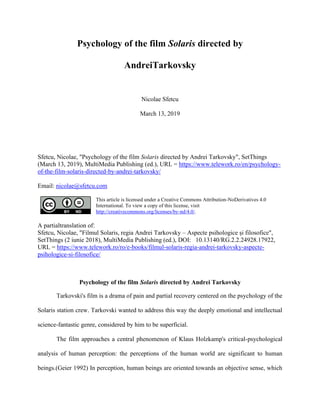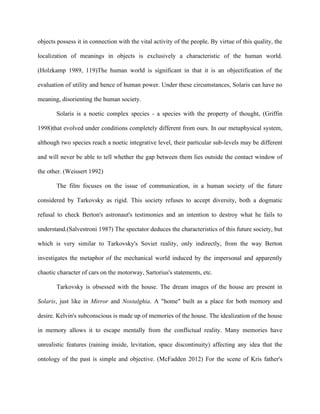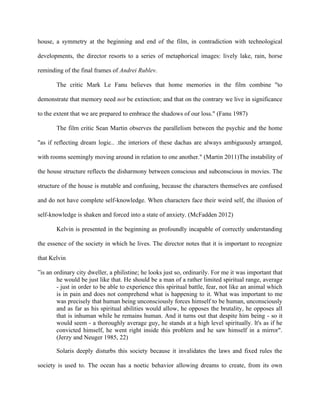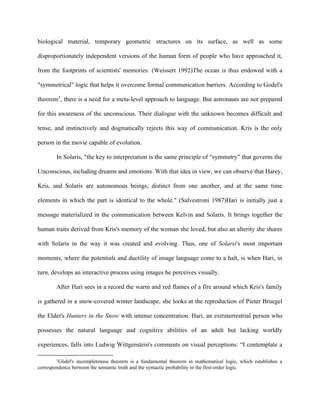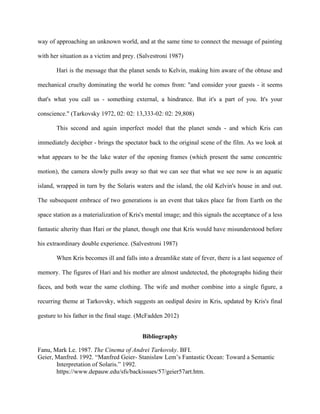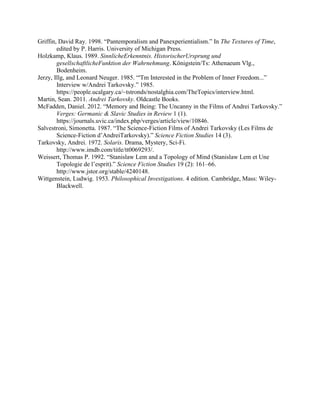Psychology of the film Solaris directed by Andrei Tarkovsky
- 1. Psychology of the film Solaris directed by AndreiTarkovsky Nicolae Sfetcu March 13, 2019 Sfetcu, Nicolae, "Psychology of the film Solaris directed by Andrei Tarkovsky", SetThings (March 13, 2019), MultiMedia Publishing (ed.), URL = https://www.telework.ro/en/psychology- of-the-film-solaris-directed-by-andrei-tarkovsky/ Email: nicolae@sfetcu.com This article is licensed under a Creative Commons Attribution-NoDerivatives 4.0 International. To view a copy of this license, visit http://creativecommons.org/licenses/by-nd/4.0/. A partialtranslation of: Sfetcu, Nicolae, "Filmul Solaris, regia Andrei Tarkovsky ¨C Aspecte psihologice ?i filosofice", SetThings (2 iunie 2018), MultiMedia Publishing (ed.), DOI: 10.13140/RG.2.2.24928.17922, URL = https://www.telework.ro/ro/e-books/filmul-solaris-regia-andrei-tarkovsky-aspecte- psihologice-si-filosofice/ Psychology of the film Solaris directed by Andrei Tarkovsky Tarkovski's film is a drama of pain and partial recovery centered on the psychology of the Solaris station crew. Tarkovski wanted to address this way the deeply emotional and intellectual science-fantastic genre, considered by him to be superficial. The film approaches a central phenomenon of Klaus Holzkamp's critical-psychological analysis of human perception: the perceptions of the human world are significant to human beings.(Geier 1992) In perception, human beings are oriented towards an objective sense, which
- 2. objects possess it in connection with the vital activity of the people. By virtue of this quality, the localization of meanings in objects is exclusively a characteristic of the human world. (Holzkamp 1989, 119)The human world is significant in that it is an objectification of the evaluation of utility and hence of human power. Under these circumstances, Solaris can have no meaning, disorienting the human society. Solaris is a noetic complex species - a species with the property of thought, (Griffin 1998)that evolved under conditions completely different from ours. In our metaphysical system, although two species reach a noetic integrative level, their particular sub-levels may be different and will never be able to tell whether the gap between them lies outside the contact window of the other. (Weissert 1992) The film focuses on the issue of communication, in a human society of the future considered by Tarkovsky as rigid. This society refuses to accept diversity, both a dogmatic refusal to check Berton's astronaut's testimonies and an intention to destroy what he fails to understand.(Salvestroni 1987) The spectator deduces the characteristics of this future society, but which is very similar to Tarkovsky's Soviet reality, only indirectly, from the way Berton investigates the metaphor of the mechanical world induced by the impersonal and apparently chaotic character of cars on the motorway, Sartorius's statements, etc. Tarkovsky is obsessed with the house. The dream images of the house are present in Solaris, just like in Mirror and Nostalghia. A "home" built as a place for both memory and desire. Kelvin's subconscious is made up of memories of the house. The idealization of the house in memory allows it to escape mentally from the conflictual reality. Many memories have unrealistic features (raining inside, levitation, space discontinuity) affecting any idea that the ontology of the past is simple and objective. (McFadden 2012) For the scene of Kris father's
- 3. house, a symmetry at the beginning and end of the film, in contradiction with technological developments, the director resorts to a series of metaphorical images: lively lake, rain, horse reminding of the final frames of Andrei Rublev. The critic Mark Le Fanu believes that home memories in the film combine "to demonstrate that memory need not be extinction; and that on the contrary we live in significance to the extent that we are prepared to embrace the shadows of our loss." (Fanu 1987) The film critic Sean Martin observes the parallelism between the psychic and the home "as if reflecting dream logic.. .the interiors of these dachas are always ambiguously arranged, with rooms seemingly moving around in relation to one another." (Martin 2011)The instability of the house structure reflects the disharmony between conscious and subconscious in movies. The structure of the house is mutable and confusing, because the characters themselves are confused and do not have complete self-knowledge. When characters face their weird self, the illusion of self-knowledge is shaken and forced into a state of anxiety. (McFadden 2012) Kelvin is presented in the beginning as profoundly incapable of correctly understanding the essence of the society in which he lives. The director notes that it is important to recognize that Kelvin ˇ±is an ordinary city dweller, a philistine; he looks just so, ordinarily. For me it was important that he would be just like that. He should be a man of a rather limited spiritual range, average - just in order to be able to experience this spiritual battle, fear, not like an animal which is in pain and does not comprehend what is happening to it. What was important to me was precisely that human being unconsciously forces himself to be human, unconsciously and as far as his spiritual abilities would allow, he opposes the brutality, he opposes all that is inhuman while he remains human. And it turns out that despite him being - so it would seem - a thoroughly average guy, he stands at a high level spiritually. lt's as if he convicted himself, he went right inside this problem and he saw himself in a mirror". (Jerzy and Neuger 1985, 22) Solaris deeply disturbs this society because it invalidates the laws and fixed rules the society is used to. The ocean has a noetic behavior allowing dreams to create, from its own
- 4. biological material, temporary geometric structures on its surface, as well as some disproportionately independent versions of the human form of people who have approached it, from the footprints of scientists' memories. (Weissert 1992)The ocean is thus endowed with a "symmetrical" logic that helps it overcome formal communication barriers. According to Godel's theorem1 , there is a need for a meta-level approach to language. But astronauts are not prepared for this awareness of the unconscious. Their dialogue with the unknown becomes difficult and tense, and instinctively and dogmatically rejects this way of communication. Kris is the only person in the movie capable of evolution. In Solaris, "the key to interpretation is the same principle of ˇ°symmetryˇ± that governs the Unconscious, including dreams and emotions. With that idea in view, we can observe that Harey, Kris, and Solaris are autonomous beings, distinct from one another, and at the same time elements in which the part is identical to the whole." (Salvestroni 1987)Hari is initially just a message materialized in the communication between Kelvin and Solaris. It brings together the human traits derived from Kris's memory of the woman she loved, but also an alterity she shares with Solaris in the way it was created and evolving. Thus, one of Solaris's most important moments, where the potentials and ductility of image language come to a halt, is when Hari, in turn, develops an interactive process using images he perceives visually. After Hari sees in a record the warm and red flames of a fire around which Kris's family is gathered in a snow-covered winter landscape, she looks at the reproduction of Pieter Bruegel the Elder's Hunters in the Snow with intense concentration. Hari, an extraterrestrial person who possesses the natural language and cognitive abilities of an adult but lacking worldly experiences, falls into Ludwig Wittgenstein's comments on visual perceptions: ˇ°I contemplate a 1 G?del's incompleteness theorem is a fundamental theorem in mathematical logic, which establishes a correspondence between the semantic truth and the syntactic probability in the first-order logic.
- 5. face and suddenly notice its likeness to another. I see that it has not changed; and yet I see it differently. I call this experience ˇ®noticing an aspectˇŻˇ± (Wittgenstein 1953, 193)Hari notes the element that painting has in common with the sequence he has been watching - snow - and this triggers an associative process that allows her to see painting in a different way. She isolates certain properties, associates them with other images and at the same time synthesizes their common details in order to clarify and illuminate each other. Hunters in the Snow (1565), by Pieter Bruegel the Elder At the same time, Bruegel, with his gray and green tones and his white of ice, conveys a sense of cold, loneliness, lack of communication. The lousy and dark hunters, supposedly unnecessarily killing, seem to be linked to Hari's imminent closure of dissolution in Sartorius's annihilator as a victim of a cold ferocity she feels but does not understand. Painting gives Hari a
- 6. way of approaching an unknown world, and at the same time to connect the message of painting with her situation as a victim and prey. (Salvestroni 1987) Hari is the message that the planet sends to Kelvin, making him aware of the obtuse and mechanical cruelty dominating the world he comes from: "and consider your guests - it seems that's what you call us - something external, a hindrance. But it's a part of you. It's your conscience." (Tarkovsky 1972, 02: 02: 13,333-02: 02: 29,808) This second and again imperfect model that the planet sends - and which Kris can immediately decipher - brings the spectator back to the original scene of the film. As we look at what appears to be the lake water of the opening frames (which present the same concentric motion), the camera slowly pulls away so that we can see that what we see now is an aquatic island, wrapped in turn by the Solaris waters and the island, the old Kelvin's house in and out. The subsequent embrace of two generations is an event that takes place far from Earth on the space station as a materialization of Kris's mental image; and this signals the acceptance of a less fantastic alterity than Hari or the planet, though one that Kris would have misunderstood before his extraordinary double experience. (Salvestroni 1987) When Kris becomes ill and falls into a dreamlike state of fever, there is a last sequence of memory. The figures of Hari and his mother are almost undetected, the photographs hiding their faces, and both wear the same clothing. The wife and mother combine into a single figure, a recurring theme at Tarkovsky, which suggests an oedipal desire in Kris, updated by Kris's final gesture to his father in the final stage. (McFadden 2012) Bibliography Fanu, Mark Le. 1987. The Cinema of Andrei Tarkovsky. BFI. Geier, Manfred. 1992. ˇ°Manfred Geier- Stanislaw LemˇŻs Fantastic Ocean: Toward a Semantic Interpretation of Solaris.ˇ± 1992. https://www.depauw.edu/sfs/backissues/57/geier57art.htm.
- 7. Griffin, David Ray. 1998. ˇ°Pantemporalism and Panexperientialism.ˇ± In The Textures of Time, edited by P. Harris. University of Michigan Press. Holzkamp, Klaus. 1989. SinnlicheErkenntnis. HistorischerUrsprung und gesellschaftlicheFunktion der Wahrnehmung. K?nigstein/Ts: Athenaeum Vlg., Bodenheim. Jerzy, Illg, and Leonard Neuger. 1985. ˇ°'Tm Interested in the Problem of Inner Freedom...ˇ± Interview w/Andrei Tarkovsky.ˇ± 1985. https://people.ucalgary.ca/~tstronds/nostalghia.com/TheTopics/interview.html. Martin, Sean. 2011. Andrei Tarkovsky. Oldcastle Books. McFadden, Daniel. 2012. ˇ°Memory and Being: The Uncanny in the Films of Andrei Tarkovsky.ˇ± Verges: Germanic & Slavic Studies in Review 1 (1). https://journals.uvic.ca/index.php/verges/article/view/10846. Salvestroni, Simonetta. 1987. ˇ°The Science-Fiction Films of Andrei Tarkovsky (Les Films de Science-Fiction dˇŻAndreiTarkovsky).ˇ± Science Fiction Studies 14 (3). Tarkovsky, Andrei. 1972. Solaris. Drama, Mystery, Sci-Fi. http://www.imdb.com/title/tt0069293/. Weissert, Thomas P. 1992. ˇ°Stanislaw Lem and a Topology of Mind (Stanislaw Lem et Une Topologie de lˇŻesprit).ˇ± Science Fiction Studies 19 (2): 161¨C66. http://www.jstor.org/stable/4240148. Wittgenstein, Ludwig. 1953. Philosophical Investigations. 4 edition. Cambridge, Mass: Wiley- Blackwell.

